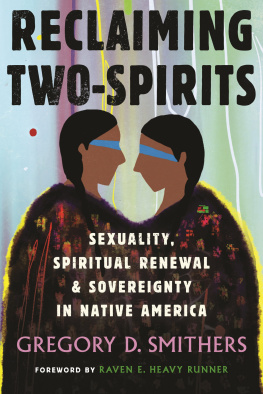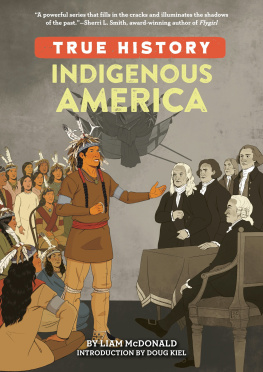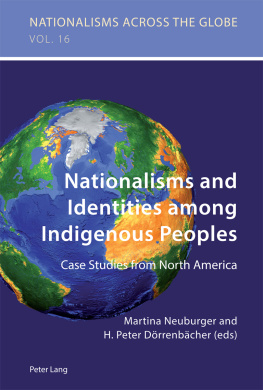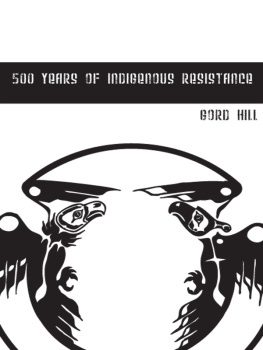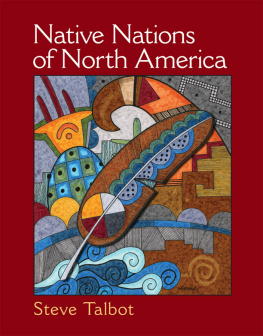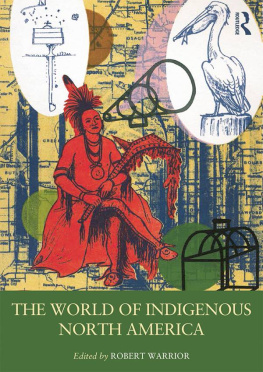Contents
Pagebreaks of the print version
Guide
PRAISE FOR RECLAIMING TWO-SPIRITS
From the onset of colonization until well into the present, the discourse and histories of Two-Spirit Indigenous peoples have remained a puzzle for Indigenous and non-Indigenous people alike. Reclaiming Two-Spirits will help you solve that puzzle. Using familiar and obscure stories, Smithers skillfully reveals the centrality of Two-Spirit struggles within the matrix of settler-colonial domination and the Indigenous struggle for freedom. He reveals the destructive nature of colonial violence and the possibilities of a Two-Spirit future. An original contribution to Indigenous cultural and intellectual histories, an understanding of the links between language and power and Indigenous futures, this book will not only educate your mind but will also touch your spirit.
Kyle T. Mays (Black/Saginaw Chippewa), author of An Afro-Indigenous History of the United States
Lost teachings are found in this compelling revelation on the complexity of Two-Spirit people. Based on chronicles of Native culture and historical documents, as well as oral histories and interviews, Reclaiming Two-Spirits offers an understanding of how Two-Spirit gives balance in a binary world. A reminder to everyone to have more empathy and compassion.
Lynette Allston, chief of the Nottoway Indian Tribe of Virginia
Smitherss Reclaiming Two-Spirits compels readers to rethink gender and sexuality from the nonbinary point of view of Indigenous cultures, which uses gender-neutral and polyvalent words to express an array of identities. Smithers recovers the Two-Spirits who lie hidden beneath the homophobic language of archival records, obliging not only historians but everyone who cares about Indigenous peoples to be more aware of gender biases and how language is a tool of colonization.
David Martnez (Akimel Oodham/Hia Ced Oodham/Mexican), author of Life of the Indigenous Mind
Gregory D. Smitherss Reclaiming Two-Spirits sheds welcome light on the deeply misunderstood topic of how Native Americans with diverse sexual and gender identities relate to both their native cultures and the settler societiesthey embrace traditional roles that are often disavowed in their native cultures due to the legacy of colonialism, while at the same time resisting conflation with LGBT identities of Eurocentric origin. Smitherss obvious sympathy for his subject, along with his cogent scholarship, engaging storytelling, and lucid prose, makes the complexly contested space that Two-Spirit people occupy accessible and understandable to general audiences of Natives and settlers alike.
Susan Stryker, author of Transgender History: The Roots of Todays Revolution, and founding co-editor of TSQ: Transgender Studies Quarterly
Reclaiming Two-Spirits is by far the most compelling study to date of an evolving tradition and way of life that has always operated according to a cultural logic of its own and that we can appreciate fully only by taking that cultural logic seriously. Setting aside Anglo-American assumptions and categories, Smithers has listened closely to Two-Spirit people in the present and to traces of their voices in historical sources. This book is a major contribution to our understanding of Native American cultures and to an authentically diverse history of gender and sexuality.
Richard Godbeer, author of Sexual Revolution in Early America
Reclaiming Two-Spirits is the book that weve been waiting for! Finally, a readable and reliable guide to the history of Americas Two-Spirit people.
Rachel Hope Cleves, author of Charity and Sylvia: A Same-Sex Marriage in Early America
ALSO BY GREGORY D. SMITHERS
The Cherokee Diaspora: An Indigenous History of Migration, Resettlement, and Identity
Native Southerners: Indigenous History from Origins to Removal
Native Diasporas: Indigenous Identities and Settler Colonialism in the Americas (coedited with Brooke N. Newman)
Racism in American Popular Media: From Aunt Jemima to the Frito Bandito (coauthored with Brian D. Behnken)
Slave Breeding: Sex, Violence, and Memory in African American History
Science, Sexuality, and Race in the United States and Australia, 1780s1940s
QUEER ACTION/QUEER IDEAS
A unique series addressing pivotal issues within the LGBTQ movement
BOOKS IN THE QUEER ACTION SERIES
Come Out and Win: Organizing Yourself, Your Community, and Your World, by Sue Hyde
Family Pride: What LGBT Families Should Know About Navigating Home, School, and Safety in Their Neighborhoods, by Michael Shelton
Out Law: What LGBT Youth Should Know About Their Legal Rights, by Lisa Keen
BOOKS IN THE QUEER IDEAS SERIES
At the Broken Places: A Mother and Trans Son Pick Up the Pieces, by Mary Collins and Donald Collins
Beyond (Straight and Gay) Marriage: Valuing All Families Under the Law, by Nancy D. Polikoff
The Economic Case for LGBT Equality, by M. V. Lee Badgett
From the Closet to the Courtroom: Five LGBT Rights Lawsuits That Have Changed Our Nation, by Carlos A. Ball
Gaga Feminism: Sex, Gender, and the End of Normal, by J. Jack Halberstam
God vs. Gay?: The Religious Case for Equality, by Jay Michaelson
Loves Promises: How Formal and Informal Contracts Shape All Kinds of Families, by Martha M. Ertman
The Queering of Corporate America, by Carlos A. Ball
Queer (In)Justice: The Criminalization of LGBT People in the United States, by Joey L. Mogul, Andrea J. Ritchie, and Kay Whitlock

FOREWORD
WHEN I WAS YOUNG , my grandmother often told us that our words have power. Be mindful of how you talk as you have the power to hurt or heal one another. The medicine one carries is evident by what one says and, today, by what one writes. As a young person, I realized early I was not like my heterosexual counterparts and they in turn let me know this. As adolescence turned into my later teen years, that reality became even more stark. I sought to find who I was, to gather strength in a colonized world that told me I did not belong. Although we as Indigenous people have fought against weapons of war, disease, and famine, it was the education system that has caused most harm to those of us remaining from this onslaught. Not until I came across the books of Walter Williams, Will Roscoe, and others did I find a path toward healing. Along the way, I heard of a gathering of others like me seeking power to overcome the plight brought by Europeans. I found myself in the company of Wesley Thomas, Beverly Little Thunder, Richard LaFortune, Janet Spotted Eagle, Michael Red Earth, Muriel Miguel, and Clyde Hall. I learned much of who I am as a Two-Spirit from those elders. They walked before us, sharing all they had learned, guiding us toward a role that would help our nations.
When I was asked by Dr. Smithers to write this foreword, I wondered what medicine he added to this path. I have in my own journey read many books of Two-Spirit people and spoken with many of my contemporaries about what these words meant to us as Indigenous LGBTQ2S+ people. We discussed how and who should convey this medicine. Although Ive been suspicious of non-Native people doing this work, I also realized that a lot of this information would have been lost were it not for the non-Native people who recorded their journeys through Turtle Island, as Indigenous people call North America. Although their intent may not have been to empower us, the remnants of their words have allowed for a glimpse of who we were in past centuries. Like those of us who have turned the hurtful words of queer into words of power, we have looked past their ignoble intent to glean the chaff and make for ourselves sustenance to carry on the work intended by our people and our Creator. In the pages of Dr. Smitherss

